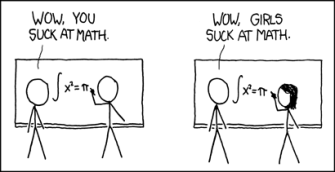This post originally appeared on the Teaching Now blog.

A study from the National Bureau of Economic Research, released in February, has shown that teacher bias early in a girl’s education can have significant effects on her later success in STEM subjects, including whether or not she chooses to take classes in those subjects in high school.
The study followed roughly 3,000 Tel Aviv students from 5th grade through their graduation from high school. Researchers compared students’ results on national blind-graded exams in 5th grade to their results a year later on similar internal exams that were not blind-graded.
On Hebrew and English tests, researchers found that the difference between blind and non-blind scores was statistically insignificant. In math, however, while girls performed better than boys on the blind math tests, teachers scored boys higher when their gender was known, suggesting a teacher bias against girls in math.
Girls’ scores on math tests also declined relative to those of boys as they got older. Boys scored higher on national math exams in later grades, although girls performed better in the other subjects at all grade levels. Girls were also less likely to pass advanced math tests offered at the end of high school.
To determine whether or not teacher bias directly affected girls’ later success in math, the researchers looked at the progress of students whose teachers were more or less biased than others. Girls who had biased teachers in 6th grade had lower test scores in 8th grade than their peers; for boys, the opposite was true.
Bias also impacted students’ longer-term class choices. Girls whose 6th grade teachers were biased were less likely to take advanced math and science classes in high school, likely contributing to lower numbers of women going into STEM fields after graduation.
Though the study focused on Israeli students, the researchers speculate the results can be applied to students in other countries as well. It is worth noting that university-level STEM study in Israel requires high school coursework in the subject, which isn’t necessarily true at U.S. universities. Even so, students who don’t take many math and science courses in high school are less likely to pursue further education in the subject.
Though girls enroll in more high school STEM courses than boys do in the U.S., their test scores tend to be lower, and they express less interest in science overall, according to a recent report from the National Center for Education Statistics. The Tel Aviv study suggests that this lack of interest could be something teachers are influencing, whether or not they’re aware of it.
Image: “How It Works,” from XKCD. (Licensed under Creative Commons)